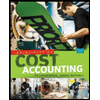In its first year of operations, the company produced and sold 70,000 units of Product A at a selling price of $20 per unit and 17,500 units of Product B at a selling price of $40 per unit. Additional information relating to the company's only two products is shown below: Product A Product B Total $436,300 Direct materials Direct labor Manufacturing overhead Cost of goods sold $249,900 $686,200 $200,000 $104,000 $304,000 $608,000 $1,598,200 The company created an activity-based costing system that allocated its manufacturing overhead costs to four activities as follows: Activity Activity Cost Pool (and Activity Measure) | Manufacturing Overhead Product A Product B | Total Machining (machine-hours) $213,500 90,000 62,500 152,500 Setups (setup hours) $157,500 75 300 375 Product design (number of products) $120,000 1 1 2 Other (organization-sustaining costs) $117,000 NA NA ΝΑ Total manufacturing overhead cost $608,000 The company's ABC implementation team also concluded that $50,000 and $100,000 of the company's advertising expenses could be directly traced to Product A and Product B, respectively The remainder of its selling and administrative expenses ($400,000) was organization-sustaining in nature. If the company uses a traditional cost system that relies on plantwide overhead allocation based on direct labor dollars, what is the total gross margin (or product margin) earned by Product B?
In its first year of operations, the company produced and sold 70,000 units of Product A at a selling price of $20 per unit and 17,500 units of Product B at a selling price of $40 per unit. Additional information relating to the company's only two products is shown below: Product A Product B Total $436,300 Direct materials Direct labor Manufacturing overhead Cost of goods sold $249,900 $686,200 $200,000 $104,000 $304,000 $608,000 $1,598,200 The company created an activity-based costing system that allocated its manufacturing overhead costs to four activities as follows: Activity Activity Cost Pool (and Activity Measure) | Manufacturing Overhead Product A Product B | Total Machining (machine-hours) $213,500 90,000 62,500 152,500 Setups (setup hours) $157,500 75 300 375 Product design (number of products) $120,000 1 1 2 Other (organization-sustaining costs) $117,000 NA NA ΝΑ Total manufacturing overhead cost $608,000 The company's ABC implementation team also concluded that $50,000 and $100,000 of the company's advertising expenses could be directly traced to Product A and Product B, respectively The remainder of its selling and administrative expenses ($400,000) was organization-sustaining in nature. If the company uses a traditional cost system that relies on plantwide overhead allocation based on direct labor dollars, what is the total gross margin (or product margin) earned by Product B?
Cornerstones of Cost Management (Cornerstones Series)
4th Edition
ISBN:9781305970663
Author:Don R. Hansen, Maryanne M. Mowen
Publisher:Don R. Hansen, Maryanne M. Mowen
Chapter2: Basic Cost Management Concepts
Section: Chapter Questions
Problem 21E: Ellerson Company provided the following information for the last calendar year: During the year,...
Related questions
Question
100%

Transcribed Image Text:In its first year of operations, the company produced and sold 70,000 units of Product A at a selling price of $20 per unit and 17,500 units of
Product B at a selling price of $40 per unit. Additional information relating to the company's only two products is shown below:
Product A Product B Total
$436,300
Direct materials
Direct labor
Manufacturing overhead
Cost of goods sold
$249,900 $686,200
$200,000 $104,000 $304,000
$608,000
$1,598,200
The company created an activity-based costing system that allocated its manufacturing overhead costs to four activities as follows:
Activity
Activity Cost Pool (and Activity Measure) | Manufacturing Overhead Product A Product B | Total
Machining (machine-hours)
$213,500
90,000
62,500
152,500
Setups (setup hours)
$157,500
75
300
375
Product design (number of products)
$120,000
1
1
2
Other (organization-sustaining costs)
$117,000
NA
NA
ΝΑ
Total manufacturing overhead cost
$608,000
The company's ABC implementation team also concluded that $50,000 and $100,000 of the company's advertising expenses could be
directly traced to Product A and Product B, respectively The remainder of its selling and administrative expenses ($400,000) was
organization-sustaining in nature.
If the company uses a traditional cost system that relies on plantwide overhead allocation based on direct labor dollars, what is the total
gross margin (or product margin) earned by Product B?
Expert Solution
This question has been solved!
Explore an expertly crafted, step-by-step solution for a thorough understanding of key concepts.
Step by step
Solved in 2 steps

Recommended textbooks for you

Cornerstones of Cost Management (Cornerstones Ser…
Accounting
ISBN:
9781305970663
Author:
Don R. Hansen, Maryanne M. Mowen
Publisher:
Cengage Learning

Managerial Accounting
Accounting
ISBN:
9781337912020
Author:
Carl Warren, Ph.d. Cma William B. Tayler
Publisher:
South-Western College Pub

Financial And Managerial Accounting
Accounting
ISBN:
9781337902663
Author:
WARREN, Carl S.
Publisher:
Cengage Learning,

Cornerstones of Cost Management (Cornerstones Ser…
Accounting
ISBN:
9781305970663
Author:
Don R. Hansen, Maryanne M. Mowen
Publisher:
Cengage Learning

Managerial Accounting
Accounting
ISBN:
9781337912020
Author:
Carl Warren, Ph.d. Cma William B. Tayler
Publisher:
South-Western College Pub

Financial And Managerial Accounting
Accounting
ISBN:
9781337902663
Author:
WARREN, Carl S.
Publisher:
Cengage Learning,

College Accounting, Chapters 1-27
Accounting
ISBN:
9781337794756
Author:
HEINTZ, James A.
Publisher:
Cengage Learning,

Principles of Cost Accounting
Accounting
ISBN:
9781305087408
Author:
Edward J. Vanderbeck, Maria R. Mitchell
Publisher:
Cengage Learning

Principles of Accounting Volume 2
Accounting
ISBN:
9781947172609
Author:
OpenStax
Publisher:
OpenStax College